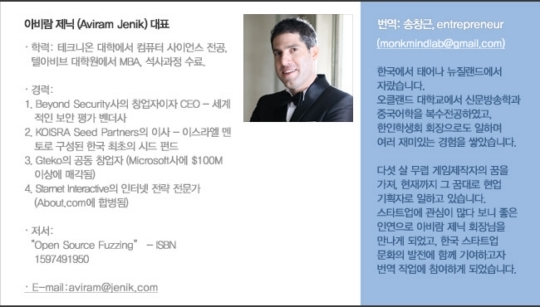페이스북은 마크 주커버그를, 아마존은 제프 베조스를, 구글은 래리와 세르게이를, 그리고 마이크로소프트는 여전히 빌 게이츠의 이미지를 가지고 있습니다. 그렇다면 어떻게하면 스타트업이 올바른 문화와 특성을 가지며 성장할 수 있게 할 수 있을까요?
창업자들은 보통 창업 후 아주 이른 시기부터 이러한 부분에 많은 에너지와 시간을 쏟곤 합니다. `회사 문화`를 만들어내는 것이 늘 그들 중요 목록의 상위권에 올라와 있는 것이지요. 이렇듯 회사 문화에 대해 걱정하는 창업자분들이 계시다면, 여기에 좋고 나쁜 소식들이 있습니다.
우선 회사 문화에 대해 더 이상 걱정하지 마십시오. 아니, `회사 문화`라는 것을 만들기 위해 시간 자체를 쏟지 마십시오. 회사 문화란 창업자 당신의 노력과는 상관없이 생겨날 것입니다. 더구나 창업자와 아주 흡사한 성격으로 말이죠. 마치 부모의 특별한 교육 없이도 그 행동을 똑 닮는 자식과도 같이 말입니다.
이유를 찾는 것은 어렵지 않은 일입니다. 창업 초기에 창업자는 결정해야 할 요소들의 대부분을 담당하게 됩니다. 사업의 이상과 방향에 맞는 사람들을 고용할 것이고, 만약 이와 다른 방식으로 일하는 직원이 있다면 그는 직/간접적으로 회사를 나가게 될 것입니다. 머지않아 모든 직원들이 창업자의 뜻을 이해하게 될 것이고요. 여기서 말하는 뜻이란, 회사 벽에 붙어 있다거나 창업자가 적어 보낸 장문의 이메일 속에 담긴 그런 것을 의미하는 게 아닙니다.
만약 창업자가 아마존의 제프 베조스처럼 지출을 줄이면서 최상의 고객 서비스를 제공하는데 집중한다면, 곧 회사 전체가 그 뜻에 따라 움직이게 될 것입니다. 그리고 회사가 성장하면서 고용되는 새로운 매니저들이 이 문화에 맞는 사람들을 고용하게 되겠지요. 그렇게 거대해진 회사는 곧 창업자의 뜻을 보유하게 될 것이고, 그 창업자가 현역으로 뛰는 이상 이를 계속해서 유지하게 될 것입니다.
그런데 여기서 중요한 건 `창업자의 좌우명`이 이 문맥에선 아무런 의미를 가지지 않는다는 것입니다. 회사 문화에 주는 영향은 창업자의 행동에 달렸지, 창업자가 어떤 말을 하느냐에 달려있지 않습니다. 만약 창업자가 단기적 수익 창출에 집중한다면, 이에 대해 장황히 말한다고 해서 회사 문화가 완벽해지거나 수준 높아지진 않습니다. 행동을 통해 회사 구성원 모두가 단기적 수익 창출이 목표이며 그 외 나머지는 둘째 요소라고 이해하게 될 것입니다.
이건 좋기도 하고 나쁘기도 한 부분입니다. 우리들 대부분은 완벽한 존재가 아니기 때문에, 장점과 단점이 동시에 가지고 있습니다. 따라서 우리가 가진 장점을 회사 문화에 넣고자 하지만 아무리 노력한다 해도 결국 단점 또한 들어가게 되기 마련이지요. 제리 영(Jerry Young)은 그의 회사 야후!를 고객에 집중하는 친근하고 혁신적인 회사로 만들어 놓았습니다.
그러나 그는 엔지니어링 적인 부분에 어느 정도의 개인적 관심사가 있었고, 회사의 주요 고객은 광고주이며 주요 제품은 콘텐츠라 믿었지요. 따라서 엔지니어가 얼마나 중요한 지를 말로써 강조했음에도 야후!의 제품 수준은 매 해가 갈수록 떨어졌고 경쟁사인 구글과 비교하면 이는 절망적이기까지 했습니다. 아주 비슷한 예로, 마이크로소프트의 스티브 발머 또한 빌 게이츠와 다르게 제품 개발보다 세일즈에 집중했었지요. 그리고 그 결과는 모두가 알다시피 너무나 자명 했구요.
걱정하지 말고 에너지를 아끼세요. 회사의 문화는 성장해갈 것이고, 책임자인 당신과 아주 흡사한 모습으로 발전할 것입니다. 그러나 명심하세요. 회사 문화는 당신의 말이 아닌 행동을 닮게 될 것 입니다.
What will your startup look like when it grows up?
One thing that many startup founders worry about, is what the startup will look like when it “grows up”. Steve Jobs was obsessively concerned that Apple will end up looking like ‘IBM’. Like him, many founders look at the established startups in envy: Facebooks looks a lot like Mark Zuckerberg; Amazon looks a lot like Jeff Bezos; Google is the image of Larry and Sergey; Microsoft is still very much in the image of Bill Gates; and the list goes on. How can we make sure our startup grows up with the right culture, behavior and characteristics?
Startup founders often spend much energy and time on this, from an early stage of the startup. Building a ‘company culture’ is always high on the priority list.
To those worried founders, I have lots of good news, but also some bad news.
Worry no more. In fact, spend no time on building a ‘company culture’. The company culture will arise, with or without your effort. Moreoever, it will evolve looking a lot like its founder. Like a child that ends up behaving like their parent (regardless of what the parent will try to teach him), so will the startup end up resembling the founder or founders.
It’s not difficult to see why: in an early stage, the founders make most or all the decisions. They hire people that are compatible with their ideals and direction. Employees that have a different way of working, will typically find themselves out of the company ? either explicitly (being fired or quitting) or implicitly (being out of the decision circle). After a short while, other employees will understand the founders’ spirit ? that is, the real spirit, not the one that is written on the office walls or in long emails from the founder.
If the founder is focused on saving costs and providing incredible customer service as Jeff Bezos is, the entire company will immediately fall in line. As the company grows, new managers will be hired to fit into this culture. Soon enough, a huge company has the founder’s properties, and continues to have, as long as the founder is in charge.
But here’s the bad news: The “founder’s moto” means nothing in the this context. The effect on the company culture is almost exclusively what the founders do, and almost nothing to do with what the founders say. If the people in charge focus on short term profit, no amount of long speeches will change the company culture to excellence, or quality. Everyone in the company will understand short term profits are the goal, and everything else is secondary.
This is a mixed blessing. Most of us are not perfect, which means we have a mix of good and bad qualities. We want the company culture to have our good qualities, but regardless of how much we try, it will have our bad qualities. Jerry Young built Yahoo! As an informal, innovative company who is focused on their customers. But he had little personal interest in the engineering side of things and believed Yahoo!’s customers are advertisers and that its main product was the content.
No matter how much he stressed that engineers were important, the product quality in Yahoo! dropped from year to year and the comparison to Google was devastating. Very much similar, Steve Balmer, unlike Bill Gates, had a focus on sales rather than product developers. Even a famous speech where we ran around the stage shouting “Developers! Developers!” didn’t convince his employees product was what mattered. They focused on features that will increase sales rather than features that would increase product quality, and the results were obvious to everyone.
So save your energy: company culture will evolve, and it will evolve to resemble the people in charge (hopefully: you). But remember, this resulting culture will end up resembling what you do, not what you say.

�
관련뉴스













